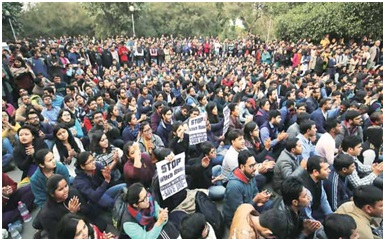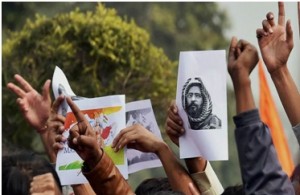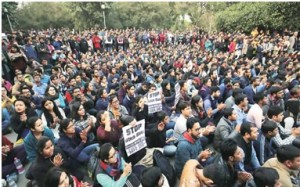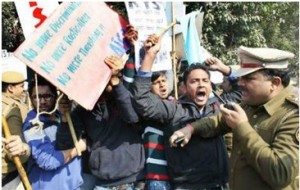Day by day the controversial Jawaharlal Nehru University issue is taking new twists and turns; for those who could follow the turn of events, here is all what happened!
Event started on February 9
It all started on this day and since then Jawaharlal Nehru University continues to boil. It was the death anniversary of Afzal Guru, the mastermind behind the Parliament attacks in 2004 who was hanged in 2013, and Jammu Kashmir Liberation Front co-founder Maqbool Bhatt.
The debate around Afzal Guru
On 9th February 2016, the ex-members of the student Organization DSU- Democratic Students Union had called for a cultural meeting of a protest against what they called “the judicial killing of Afzal Guru and Maqbool Bhatt”. This event was supposed to showcase the protest through poetry, art and music.
ABVP (Akhil Bharatiya Vidharthi Parishad) protest
The members of Akhil Bharatiya Vidharthi Parishad (ABVP) opposed to the program, and wrote to JNU administration about it, and asking for the withdrawal permission for such program, as it was harmful for the campus atmosphere.
The University Administration
The University administration ordered a disciplinary enquiry, because of clashes didn’t allowed event to take place. The administration said the event organisers went ahead without any permission.
Anti-Indian slogans
A purported video from the event shows students shouting anti-national and pro-Pakistan slogans like: “Kashmir ki azadi tak bharat ki azaadi tak, janh rahegi jari”.
An Anti-national slogan by the students at Delhi’s Jawaharlal Nehru University and it seems to be spreading at other Universities like in Jadavpur University; this entire have made India’s a massive political divide which is more pronounced as before.
Student’s statements
Students of JNU said that the students who were part of the committee that organised an event to mark death anniversary of Afzal Guru said that none of them were part of the group that was shouting slogans.
Arrest of Kanhaiya kumar
JNU Students Union President Kanihaiya Kumar was arrested on the sedition charges of anti-national sloganeering. He was under police custody for three days.
Sedition charges
A case of sedition against several unknown students was filed at Vasant kunj north police station. The university also initiated action, against eight students from academic activity, enquiry still pending, though they were is still allowed to stay in hostels as guests.
Police action
After the alleged protest videos get viral, Home Minister Rajnath Singh spoke to the Delhi Police Commissioner B.S. Bassi and said “if anyone raises anti-national slogans, and tires to disturb once country’s unity and integrity, will never be spared.
Students protest against arrest of JNU president
Students of JNU said that they will not allowed classes to be held till the released of students union president Kanhaiya kumar.
The teachers of university also protest against the arrest of student’s union president and decide not to take classes till their released.
The issue is still going on. The JNU high powered inquiry panel has found JNU students union Kanhaiya kumar to be guilty, and the Delhi court had extended the custody of Kanhaiya kumar for more two days.










The close historical resiaionlhtp I was referring to was between North Vietnam and India. North Vietnam was always the dominant half of Vietnam, in terms of their demographics, military strength and influence and the only thing prevented South Vietnam from immediate collapse was Western support. India was never close with South Vietnam during their short history, partially due to state essentially being an American client state. Also, Indo-American relations were not fantastic during the time period. A great deal of the credit for this resiaionlhtp should be assigned to Nehru, who supported Vietnam in their bid for independence against the French and he was one of the first visitors to Vietnam after their military defeat of the French at Dien Bien Phu in 1954 (turning point of first Indochina War). He also led India to play a diplomatic role in the Geneva Conference of 1954 (treaty ending war with French) and tried to make Indochina a region for peace during the from 1954-1958. Nehru made the acquaintance of his Vietnamese counterpart, Ho Chi Minh, in 1927 at an anti-colonialism conference in Brussels. Indian perception of Vietnam’s national leader is less bias then the West’s, he has been described as cross between Mao of the 1930s and Gandhi. As Nehru is arguably the most influential nationalist leader of the 20th century and an important voice in the fight against colonialism, no other leader except for Ho Chi Minh can be seen as important to representing and moulding the history of his own people. In other words, North Vietnam and India were close due to the similarities between their founders and India played the role of custodian of Indochina after the Geneva Conference. India even tried to get North Vietnam to commit themselves to peaceful coexistence with their neighbors in order to reduce anti-communist fears from the rest of southeast Asia. A key part of nonalignment was peaceful co-existence with all of his neighbors regardless of political ideology and were generally opposed to SEATO (attempt to make a NATO-lite organization in S.E. Asia with main goal of opposing communism). After participating in the Afro-Asian Conference of 1955, both North Vietnam and China subscribed to idea of peaceful co-existence (which would obviously be broken later). Indian involvement in the region reflected negatively on their resiaionlhtp with the United States, but Nehru cared more on maintaining peace in the region. India was not officially invited to Geneva, but India’s behind the scene negotiations caused then French PM Pierre Mendes, to label it the ten-power conference, nine at the table and India. They wanted both the US AND the Ussr to not involve themselves in Indochina, as well as the Chinese, French and any other external Great Powers. Indian policy of peace as a priority in Vietnam were an afterthought by the end of the 1950s because Nehru’s successors refused to follow policies which would bring them into conflict with Great Powers.I would stay the significant developments in their resiaionlhtp areNehru-Minh meeting in Brussels 1927Nehru denounces use of Indian troops by British empire in Vietnam 1945 (British briefly fought Vietnamese nationalists after the end of ww2)Asians Relations Conference in New Delhi 1947 (key conference for new and emerging countries of Asia)Nehru, one of the first people to visit Vietnam after their victory at Dien Bien Phu in 1954worked behind the scenes for national Vietnamese cause of Geneva Conference 1954India opens Consulate General in Hanoi 1954Afro-Asian Conference, got North Vietnam to agree to peaceful coexistence 1955North Vietnam opens Consulate General in New Delhi 1956President Ho Chi Minh visits India 1958President Prasad visits North Vietnam 1959Formal relations between Vietnam and India established in 1972 (Vietnam war ends in 1975)General Secretary of Vietnam Communist Party Le Duan visits India, 1984P.M. Rajiv Gandhi visits Vietnam, 1985 and again in 1988President Venkataraman visited Hanoi, 1991General Secretary Do Muoi visited India, 1992V. President Narsimha also visited Hanoi, 1993PM Rao visited Vietnam, 1994PM Van Klet and President Duc Luong visited India, 1997 and 1999PM Vajpayee visited Vietnam, 2001Gen. Secretary of Comm. Party, Nong Duc Manh visited India, 2003Honorable Speaker Chatterjee led a delegation to Vietnam 2007Joint declaration on Strategic Partnership signed between two nations, 2007PM Tan Dung visited India, 2007President Patil visited Vietnam, 2008To answer your last question, India and Vietnam are growing closer partially due to Chinese growing influence. Vietnam has recently started taking advantage of their large population (top 15, 12th worldwide I believe) and natural resources similar to how both India and China are. India and Vietnam often cooperate on various forums such as the Mekong Ganga Cooperation and ASEAN in security manners, due to their shared maritime and land threat from China. The Sino-Indian resiaionlhtp is not positively impacted by their strategic partnership with their fellow communist country (they also have a history of not getting along with China and had a recent border war with China as well). China has publicly objected to Indian-Vietnamese agreements in trade, security and perhaps most importantly, oil exploration in South China Sea. Vietnam makes their partnership with India of high priority and India’s ONGC in a deal with Vietnamese oil companies, has jointly started to explore the natural resources of the South China Sea. China has warned India against these moves, and India has responded that they have broken no international law. China also doesn’t recognize, that their military presence in Burma, Pakistan and Bangladesh is also dangerous close to Indian borders. Indian air-force regularly trains with Vietnam and Indians are allowed to train for jungle welfare in Vietnam since 2000. Maritime security is cooperated on, with threats from piracy, terrorism and natural disasters, and policy-makers in New Delhi and Hanoi also aware of a potential threat from the Chinese navy. The Indian navy has been known to make a presence in the South China Sea as well as the all of the waterways in Southeast Asia to ensure safety and security for key trade routes and welfare for the entire ASEAN, either unilaterally or in coordination with Vietnam and other nations. In other words, the Indians have to be careful as they grow closeness to Vietnam due to the history between all three nations and the potential risk of conflict due to natural resources and the close proximity of all three countries. If you have any more questions check outIndia-Vietnam Relations, First to Twenty-First Century. by Geetesh SharmaVietnam Today and Indo-Vietnam Relations. by V.D. ChopraIndia-Vietnam Strategic Partnership. by Sakhuja Vijayor checkout the embassy websites, the Embassy of India in Hanoi isconsiderably better quality and has more current information then its counterpart
I am the business owner of JustCBD company (justcbdstore.com) and I am currently looking to grow my wholesale side of company. I am hoping someone at targetdomain share some guidance . I thought that the most suitable way to do this would be to connect to vape stores and cbd stores. I was hoping if anybody could recommend a qualified site where I can buy Vape Shop B2B Data List I am currently examining creativebeartech.com, theeliquidboutique.co.uk and wowitloveithaveit.com. On the fence which one would be the best option and would appreciate any guidance on this. Or would it be simpler for me to scrape my own leads? Ideas?
Hello! I could have sworn I’ve been to your blog before but after looking at some of the posts I realized it’s new to me. Regardless, I’m certainly delighted I found it and I’ll be bookmarking it and checking back often!
I’d like to thank you for the efforts you have put in penning this site. I’m hoping to see the same high-grade blog posts from you in the future as well. In fact, your creative writing abilities has encouraged me to get my own site now 😉